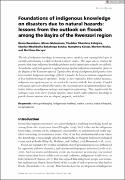| dc.contributor.author | Bwambale, Bosco | |
| dc.contributor.author | Muhumuza, Moses | |
| dc.contributor.author | Tibasiima Kahigwa, Thaddeo | |
| dc.contributor.author | Mbalibulha Bakahinga Baluku, Stanley | |
| dc.contributor.author | Kasozi, Humphrey | |
| dc.contributor.author | Nyeko, Martine | |
| dc.contributor.author | Kervyn, Matthieu | |
| dc.date.accessioned | 2024-04-03T10:13:43Z | |
| dc.date.available | 2024-04-03T10:13:43Z | |
| dc.date.issued | 2023-01 | |
| dc.identifier.issn | 0361-3666 (Print) | |
| dc.identifier.issn | 1467-7717 (Online) | |
| dc.identifier.other | https://doi.org/10.1111/disa.12529 | |
| dc.identifier.uri | http://hdl.handle.net/20.500.12280/3095 | |
| dc.description.abstract | The role of indigenous knowledge in increasing context specificity and exposing blind spots in scientific understanding is widely evidenced in disaster studies. This paper aims to structure the processes that shape indigenous knowledge production and its optimisation using the case of floods. An inductive analytical approach is applied among riparian indigenous communities ( focus on the Bayira) of the Rwenzori region of Uganda where plenty of indigenous flood practices have been recorded. Indigenous knowledge of floods is found to be based on intimate comprehension of local hydrometeorological regularities. Insofar as these regularities follow natural dynamics, indigenous socio-epistemic processes are noted to be consistent with the laws of nature. Coupled with regular open sociocultural deliberations, the conceptualisation of hydrometeorological regu-larities induces an indigenous ontology and empiricist epistemology. This, together with the techniques used, is the driver of crucial epistemic virtues which enable indigenous knowledge to provide disaster solutions that are adapted, pragmatic, and holistic. | en_US |
| dc.language.iso | en | en_US |
| dc.publisher | Wiley Online Library | en_US |
| dc.relation.ispartofseries | Disasters;Volume 47, Issue 1 | |
| dc.subject | Ethnophilosophy | en_US |
| dc.subject | Indigenous method | en_US |
| dc.subject | Native science | en_US |
| dc.subject | Natural hazard | en_US |
| dc.subject | Social natures | en_US |
| dc.title | Foundations of indigenous knowledge on disasters due to natural hazards: lessons from the outlook on floods among the Bayira of the Rwenzori region | en_US |
| dc.type | Article | en_US |


